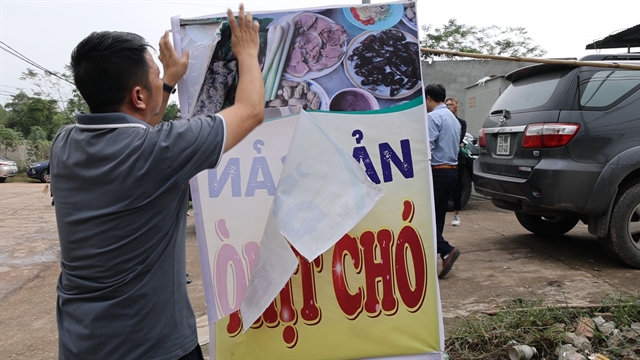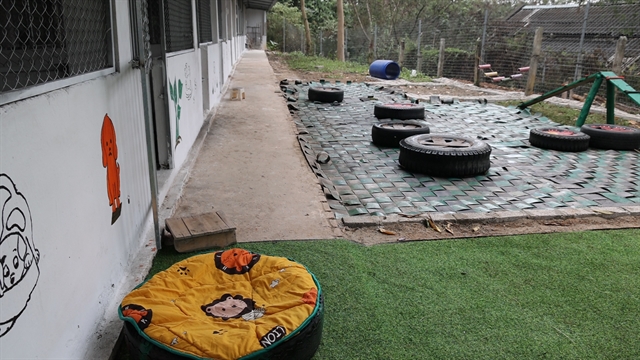 Society
Society

 |
| Restaurant owner Đàm Thế Hiệp tears down the sign of his business. VNS Photo Vân Nguyễn |
Vân Nguyễn and Paul Kennedy
The sounds of the plastic sign being ripped from its metal frame went someway to drowning out the constant barking from the caged dogs nearby.
The noise from the animals goes hand-in-hand with items on the menu at a restaurant selling dog meat.
But owner DamĐàm Thế Hiệp says enough is enough. He has had a change of heart, and decided to close his slaughterhouse-cum-eatery in northern Thái Nguyên Province and do something completely different.
“Back in the day, financial conditions were poor, and our employment was not stable, so I opened a dog and cat meat restaurant to make ends meet,” he said.
“But after multiple times slaughtering animals, something did not feel right. Some dogs showed their emotions as we took them to the slaughterhouse, and I felt really sorry for them. So I ended the business and switched to another job.”
By his own admission, Hiệp says he has killed thousands of dogs. The last 18 animals he has left in his cages face a much brighter future.
Humane Society International has been working with him to help his transition run smoothly. They have facilitated not only the animals' rescue but also found them a new home.
Thái Nguyên University of Agriculture and Forestry has built a special rescue centre. The dogs from this restaurant are its first residents.
 |
| One of the puppies rescued from the dog meat restaurant in Thái Nguyên. VNS Photo Vân Nguyễn |
Lola Webber, Humane Society Director for their End Dog Meat Trade campaign, says they have been helping Hiệp set up an alternative business after he decided to close his restaurant.
“It’s a goosebump moment,” she said. “We work throughout the year to try to create these change.
“And then when these kinds of opportunities come, not only can we close down the slaughterhouse permanently but we can rescue animals and make right where they have been wronged.
“It's a really special day.”
Hiệp's new venture will be the polar opposite of what has been used to. Although one of only a few dog and cat restaurants in town, he’s decided to do something completely different.
And he hopes his new career choice will bring more positive energy to his family.
He said: “My new job is to provide fertilisers, pesticides and plant species, as well as a small convenience store for the locals.
“My decision is not to trade cat and dog meat anymore, because I don’t want to kill or end more lives, I want better karma for the future.
“The province and philanthropists helped me change my business model, which is more suitable for me. It is better, my conscience is at peace, and life is happier.
“Back when we still ran a dog and cat meat business, those cages were used to house dogs bought in, which were then transported to the slaughterhouse. From now on these cages will be destroyed and are no longer in use.”
Moral perspective aside, eating dog meat can also be dangerous. Many animals chosen for slaughter are strays, and at a high risk of rabies.
The province is trying to vaccinate as many as it can, but some will obviously slip through the net.
Lê Đắc Vinh from the Department of Livestock, Veterinary and Fisheries, said: “We have vaccinated about 60 per cent of the dogs against rabies, and in some towns and communes this figure could be up to 80 per cent to control the disease and ensure safety for people.
“Dogs are very friendly and close to people, and really affectionate. In Thái Nguyên Province, people still consume dog meat in some places, but these rescues are to raise awareness on taking care of these friendly dogs, and to ensure a safe life for people.
“Thái Nguyên Province will put in more effort to prevent rabies among the dogs, and we do receive more support from different organisations on this matter.”
It’s organisations like Humane Society International that are helping make a difference. This rescue is part of their ‘Models for Change’ campaign to end dog meat consumption.
For many in the business, it’s a way of life, so leaving the industry can be difficult. The Humane Society strives to make their efforts sustainable.
“The way that we work is that we come and we find those who are working within the industry, or often they find us,” Lola added
“We find out what it is where their true passions and interests lie and expertise lie. We are about making sustainable change, not coming in, taking dogs off-site and letting the slaughterhouse operations resume the next day.
“It is very much about working with the traders, hearing them and finding out how we can facilitate that change.”
 |
| The new rescue centre at Thái Nguyên University of Agriculture and Forestry. VNS Photo Paul Kennedy |
For the dogs rescued last week, a new, forever home, awaits them. Potential pet adopters can visit the University’s new rescue centre and take their pick.
“Students and lecturers in my faculty have wanted to do this for long,” said the head of veterinary husbandry department, Phan Thị Hồng Phúc. “We all have love for animals.”
And that love for the pets themselves rather than eating their meat seems to be spreading rapidly in a country that kills more dogs for meat than any other in Southeast Asia. VNS




